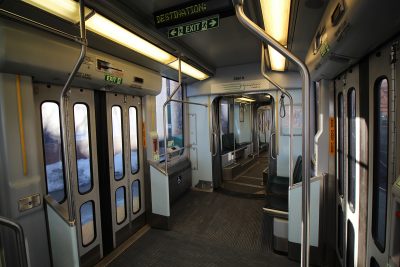Boston is no longer the most traffic congested city in the nation, according to a Tuesday report by the INRIX research firm.

Boston drivers lost an average of 48 hours to traffic in 2020 — down from 101 hours in 2019 — according to the report. The city’s congestion now ranks fourth in the United States, behind New York, Philadelphia and Chicago.
The change stems from COVID-19 lockdowns’ impact on rush traffic, with fewer cars and decreased activity on the roads.
Jonathan Buonocore, a research scientist at Harvard University’s Center for Climate, Health and the Global Environment, said traffic is a major contributor to air pollution in and around Boston.
“It’s kind of a natural experiment in terms of what would happen if we were to remove these sources of emissions,” Buonocore said. “It’ll be useful evidence to get a picture of what benefits may look like from implementing other policies.”
The INRIX report includes a congestion index and measures the current state of transportation in major cities by merging transportation data gathered from sources — such as GPS-equipped mobile devices and connected vehicles — for the past three years.
It analyzes data from peak and quiet periods to find how many hours on average drivers lose due to congestions and looks at data points, like miles driven, alongside collision data.
Last May, Mayor Marty Walsh introduced steps to improve Boston’s transportation in the healthy streets project, which prioritizes improved access to public transit and travelers’ safety.
Boston saw the country’s second largest drop in downtown travel, with trips falling 87 percent between February and April 2020, according to the INRIX report.
Buonocore said excess traffic degrades public health, in addition to the environment.
“By and large, we are depending on fossil fuels for transportation,” Buonocore said. “When we burn petroleum, we get both carbon dioxide, which leads to air pollution, and then we get a whole suite of different air pollutants … You’ve probably seen the headlines of 8 million people die a year due to air pollution from fossil fuels.”
The pandemic may have stimulated increases and decreases in vehicle traffic, said Douglas Brugge, chair of Public Health Science at the University of Connecticut and director of the Community Assessment of Freeway Exposure and Health study — an interdepartmental analysis of the health risks of highway pollution.
“People are driving less because they’re working at home and ordering online instead of going shopping,” he said. “So the amount of traffic on the roadways is lower and that is reducing the air pollution levels, especially for people who live right near major roads or highways.”
At the same time, Brugge said the pandemic stimulated concerns about infection on public transit.
“People are afraid of going on public transportation,” Brugge said. “If that continues as the pandemic declines, that could become more of a problem, if more and more people drive.”
Even the surge in e-commerce could have unexpected consequences, Brugge said.
“I know from my own experience driving on the highway, because of all that online ordering, there’s a lot of diesel trucks out there,” he said. “Diesel trucks contribute to a lot more pollution than cars.”
Professor Jonathan Levy, who chairs the Department of Environmental Health at Boston University’s School of Public Health, said the drop in traffic congestion is temporary.
“This is not a permanent state of affairs, certainly,” Levy said. “I guess that the broad worry would be if we disinvest in, for example, public transportation because of this dip, and then people return to normal activities and drive into work, it’ll exacerbate the already fairly severe congestion that we faced in the Boston area for some time.”
Levy said the decline in ridership may already have impacted transportation infrastructures — the MBTA has issued a series of temporary service cuts since the pandemic began, lowering ridership.
“The broad question is, are some of these things short-term blips that could then return if we get back to pre-pandemic levels of activity?” Levy said. “Or are we taking apart that infrastructure and presuming that people will want to drive to work for a variety of reasons, and then we are using much more congestion in the future?”
Levy added that, despite concerns regarding public transit, the pandemic may present an opportunity to review and improve Boston’s transportation infrastructure.
“Ideally, we take this opportunity to think about how to really build a sustainable transportation system,” Levy said. “And if, indeed, some of the shifts in activity are long lasting, that there’s more working from home and more time flexibility, use that not as an opportunity to induce more traffic, but to create a truly sustainable and low impact transportation system.”






























































































































